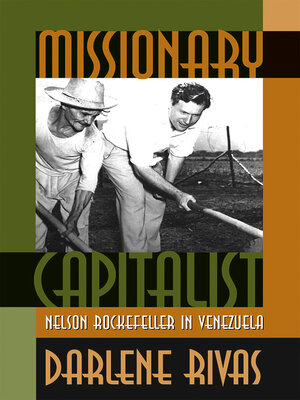Missionary Capitalist
ebook ∣ Nelson Rockefeller in Venezuela · The Luther H. Hodges Jr. and Luther H. Hodges Sr. Series on Business, Entrepreneurship, and Public Policy
By Darlene Rivas

Sign up to save your library
With an OverDrive account, you can save your favorite libraries for at-a-glance information about availability. Find out more about OverDrive accounts.
Find this title in Libby, the library reading app by OverDrive.



Search for a digital library with this title
Title found at these libraries:
| Library Name | Distance |
|---|---|
| Loading... |
The first work to draw on Nelson A. Rockefeller’s newly available personal papers as well as research in Latin American archives, Missionary Capitalist details Rockefeller’s efforts to promote economic development in Latin America, particularly Venezuela, from the late 1930s through the 1950s.
Rockefeller’s involvement in the region began in 1936 with his investment in Creole Petroleum, the Venezuelan subsidiary of Standard Oil. Almost immediately, he began trying to influence North Americans' individual, corporate, and government relationships with Latin Americans. Through his work developing technical assistance programs for the Roosevelt administration during World War II, his business ventures (primarily agricultural production and food retailing), and his postwar founding of the nonprofit American International Association, Rockefeller hoped to demonstrate how U.S. capitalists could nurture entrepreneurial spirit and work successfully with government agencies in Latin America to encourage economic development and improve U.S.–Latin American relations. Ultimately, however, he overestimated the ability of the United States, through public or private endeavors, to promote Latin American economic, political, and social change.
This objective account paints a portrait of Rockefeller not as the rapacious, exploitative figure of stereotype, but as a man fueled by idealism and humanitarian concern as well as ambition.
Rockefeller’s involvement in the region began in 1936 with his investment in Creole Petroleum, the Venezuelan subsidiary of Standard Oil. Almost immediately, he began trying to influence North Americans' individual, corporate, and government relationships with Latin Americans. Through his work developing technical assistance programs for the Roosevelt administration during World War II, his business ventures (primarily agricultural production and food retailing), and his postwar founding of the nonprofit American International Association, Rockefeller hoped to demonstrate how U.S. capitalists could nurture entrepreneurial spirit and work successfully with government agencies in Latin America to encourage economic development and improve U.S.–Latin American relations. Ultimately, however, he overestimated the ability of the United States, through public or private endeavors, to promote Latin American economic, political, and social change.
This objective account paints a portrait of Rockefeller not as the rapacious, exploitative figure of stereotype, but as a man fueled by idealism and humanitarian concern as well as ambition.







